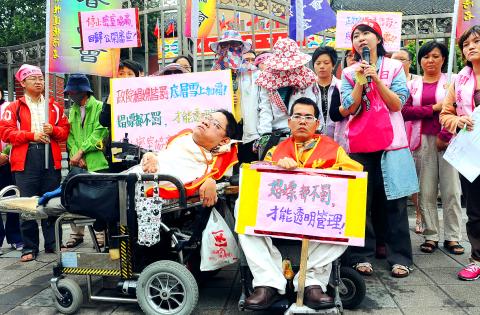The Collective of Sex Workers and Supporters (COSWAS) yesterday rallied outside the Legislative Yuan, calling for the complete decriminalization of the sex industry, before meeting lawmakers from the two main political parties.
The rally comes just a month before a clause in the Social Order Maintenance Act (社會秩序維護法) that penalizes sex workers expires.
Article 80 of the Social Order Maintenance Act, which penalizes sex workers, but not their clients, was declared “unconstitutional” by the Council of Grand Justices on Nov. 6, 2009, and it gave the government and the legislature a two-year period to amend the law.

Photo: Chang Chia-ming, Taipei Times
According to the interpretation, the council declared the clause unconstitutional because it believed that penalizing only sex workers violates of the spirit of equality embodied in the Constitution.
However, while the specific clause expires on Nov. 6, a revised law has yet to pass a legislative review.
Currently, there are three proposed amendments.
One proposed by the Executive Yuan would authorize local governments to create red light districts where prostitution is legal, but it would remain illegal outside such districts.
Another proposed by Democratic Progressive Party (DPP) Legislator Huang Sue-ying (黃淑英) seeks to penalize the client, but not the sex worker, while a third version proposed by Chinese Nationalist Party (KMT) Legislator Cheng Li-wun (鄭麗文) would decriminalize the sex trade for both the worker and the client if passed.
“The Executive Yuan’s version of the amendment only makes the situation worse because it would penalize both the sex worker and the client outside of a designated area, which is to be decided by the local government,” COSWAS executive director Chung Chun-chu (鍾君竺) said at the rally. “So when local governments refuse to create red light districts — which seems to be what would happen — it would be a de facto ban on prostitution.”
After a rally outside the Executive Yuan, COSWAS representatives petitioned lawmakers from both the DPP and the KMT.
“Right now, we don’t consider the Cabinet-proposed draft amendment our only option. We would first have to decide whether sex workers and clients should both be penalized, or if both should be exempt, before deciding whether to create red light districts,” KMT caucus deputy secretary-general Pan Wei-kang (潘維剛) said after the meeting.
On the other hand, DPP caucus whip Tsai Huang-liang (蔡煌瑯) panned the Executive Yuan’s proposal to create red light districts as “irresponsible,” adding that the DPP caucus believed that sex workers should be protected.

An essay competition jointly organized by a local writing society and a publisher affiliated with the Chinese Communist Party (CCP) might have contravened the Act Governing Relations Between the People of the Taiwan Area and the Mainland Area (臺灣地區與大陸地區人民關係條例), the Mainland Affairs Council (MAC) said on Thursday. “In this case, the partner organization is clearly an agency under the CCP’s Fujian Provincial Committee,” MAC Deputy Minister and spokesperson Liang Wen-chieh (梁文傑) said at a news briefing in Taipei. “It also involves bringing Taiwanese students to China with all-expenses-paid arrangements to attend award ceremonies and camps,” Liang said. Those two “characteristics” are typically sufficient

A magnitude 5.9 earthquake that struck about 33km off the coast of Hualien City was the "main shock" in a series of quakes in the area, with aftershocks expected over the next three days, the Central Weather Administration (CWA) said yesterday. Prior to the magnitude 5.9 quake shaking most of Taiwan at 6:53pm yesterday, six other earthquakes stronger than a magnitude of 4, starting with a magnitude 5.5 quake at 6:09pm, occurred in the area. CWA Seismological Center Director Wu Chien-fu (吳健富) confirmed that the quakes were all part of the same series and that the magnitude 5.5 temblor was

The brilliant blue waters, thick foliage and bucolic atmosphere on this seemingly idyllic archipelago deep in the Pacific Ocean belie the key role it now plays in a titanic geopolitical struggle. Palau is again on the front line as China, and the US and its allies prepare their forces in an intensifying contest for control over the Asia-Pacific region. The democratic nation of just 17,000 people hosts US-controlled airstrips and soon-to-be-completed radar installations that the US military describes as “critical” to monitoring vast swathes of water and airspace. It is also a key piece of the second island chain, a string of

The Central Weather Administration has issued a heat alert for southeastern Taiwan, warning of temperatures as high as 36°C today, while alerting some coastal areas of strong winds later in the day. Kaohsiung’s Neimen District (內門) and Pingtung County’s Neipu Township (內埔) are under an orange heat alert, which warns of temperatures as high as 36°C for three consecutive days, the CWA said, citing southwest winds. The heat would also extend to Tainan’s Nansi (楠西) and Yujing (玉井) districts, as well as Pingtung’s Gaoshu (高樹), Yanpu (鹽埔) and Majia (瑪家) townships, it said, forecasting highs of up to 36°C in those areas